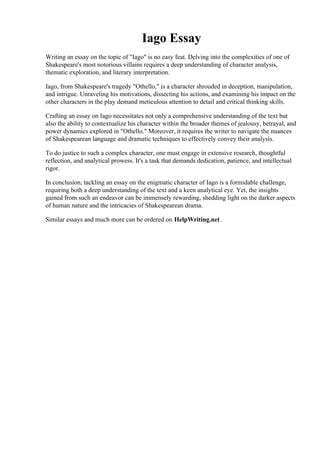In William Shakespeare’s tragic masterpiece, “Othello,” Iago emerges as an enigmatic villain whose Machiavellian machinations lead to the downfall of the titular hero. While Iago’s cunning and deceit have captivated audiences for centuries, a critical examination of his character reveals a flawed and manipulative figure who ultimately serves as a cautionary tale against the dangers of deception and the corrosive nature of jealousy.

Unmasking Iago’s Agenda
Iago’s central flaw lies in his consuming desire for revenge against Othello, whom he perceives as having wronged him. This personal vendetta fuels his actions throughout the play, driving him to orchestrate a series of elaborate schemes that eventually destroy Othello’s life and reputation. However, upon closer inspection, it becomes clear that Iago’s grievances are largely unfounded and stem from his own insecurities and egotism.
Moreover, Iago’s manipulative tactics often rely on exploiting others’ vulnerabilities. He uses Cassio’s vulnerability to flattery, Desdemona’s trust in Emilia, and Othello’s insecurities to achieve his malevolent goals. Iago’s lack of empathy and his willingness to sacrifice others for his own gain paint a chilling portrait of a cold-hearted and calculating individual.
Challenging Iago’s Machiavelli
Iago has often been compared to the 16th-century political philosopher Niccolò Machiavelli, whose theories on statecraft emphasized the use of cunning and deception. While Iago certainly embodies some of Machiavelli’s principles, his actions ultimately depart from the true Machiavellian model.
Machiavelli’s ideal ruler, as outlined in his treatise “The Prince,” is a strong, pragmatic, and decisive leader who places the interests of the state above all else. Iago, on the other hand, is motivated by petty revenge and personal gain. He lacks the vision and statesmanship of a true Machiavellian ruler and instead uses his cunning for destructive, rather than constructive, purposes.
Iago’s Demise: The Corrosive Power of Jealousy
In addition to his manipulative nature, Iago is also consumed by a deep-seated jealousy of Othello. This jealousy is not merely a professional rivalry but a profound and irrational obsession that drives Iago to ruin Othello’s life.
Iago’s jealousy is a testament to his own insecurity and a lack of self-worth. He projects his feelings of inadequacy onto Othello, seeing him as an object of envy and resentment. This destructive emotion ultimately becomes Iago’s undoing, as it blinds him to the consequences of his actions and leads him to his own downfall.
Lessons from Iago’s Deception
The story of Iago is a cautionary tale against the perils of deception and the corrosive effects of jealousy. Iago’s manipulative tactics and his willingness to sacrifice others for his own gain serve as a reminder of the destructive potential of treachery.
Moreover, Iago’s story highlights the importance of self-reflection and introspection. By examining our own motivations and biases, we can guard against falling prey to deception and protect ourselves from the damaging consequences of jealousy.
Conclusion
While Iago’s cunning and deceit may have made him a formidable villain, a critical analysis of his character reveals a flawed and manipulative individual consumed by revenge and jealousy. Iago’s actions serve as a cautionary tale against the dangers of deception and the corrosive power of negative emotions. By understanding Iago’s motivations and the consequences of his actions, we can learn invaluable lessons about the importance of honesty, self-reflection, and the destructive nature of jealousy.
